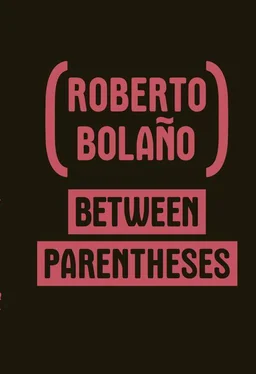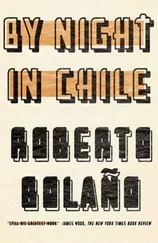Roberto Bolaño - Between Parentheses - Essays, Articles and Speeches, 1998-2003
Здесь есть возможность читать онлайн «Roberto Bolaño - Between Parentheses - Essays, Articles and Speeches, 1998-2003» весь текст электронной книги совершенно бесплатно (целиком полную версию без сокращений). В некоторых случаях можно слушать аудио, скачать через торрент в формате fb2 и присутствует краткое содержание. Год выпуска: 2011, Издательство: New Directions, Жанр: Публицистика, Критика, на английском языке. Описание произведения, (предисловие) а так же отзывы посетителей доступны на портале библиотеки ЛибКат.
- Название:Between Parentheses: Essays, Articles and Speeches, 1998-2003
- Автор:
- Издательство:New Directions
- Жанр:
- Год:2011
- ISBN:нет данных
- Рейтинг книги:4 / 5. Голосов: 1
-
Избранное:Добавить в избранное
- Отзывы:
-
Ваша оценка:
- 80
- 1
- 2
- 3
- 4
- 5
Between Parentheses: Essays, Articles and Speeches, 1998-2003: краткое содержание, описание и аннотация
Предлагаем к чтению аннотацию, описание, краткое содержание или предисловие (зависит от того, что написал сам автор книги «Between Parentheses: Essays, Articles and Speeches, 1998-2003»). Если вы не нашли необходимую информацию о книге — напишите в комментариях, мы постараемся отыскать её.
The Savage Detectives
Between Parenthese
Between Parentheses: Essays, Articles and Speeches, 1998-2003 — читать онлайн бесплатно полную книгу (весь текст) целиком
Ниже представлен текст книги, разбитый по страницам. Система сохранения места последней прочитанной страницы, позволяет с удобством читать онлайн бесплатно книгу «Between Parentheses: Essays, Articles and Speeches, 1998-2003», без необходимости каждый раз заново искать на чём Вы остановились. Поставьте закладку, и сможете в любой момент перейти на страницу, на которой закончили чтение.
Интервал:
Закладка:
Probably all of us, writers and readers alike, set out into exile, or at least into a certain kind of exile, when we leave childhood behind. Which would lead to the conclusion that the exiled person or the category of exile doesn’t exist, especially in regards to literature. The immigrant, the nomad, the traveler, the sleepwalker all exist, but not the exile, since every writer becomes an exile simply by venturing into literature, and every reader becomes an exile simply by opening a book.
The country that I come from, according to some of its native writers, is an island, the strangest island in the southern hemisphere. It’s bordered to the north by the Atacama Desert, which Chileans say with utter conviction is the most inhospitable in the world; to the east by the Andes, which, according to the same native writers, is the highest and most impassable mountain range on earth (though occasionally news comes from the other side of a fearsome and infuriating tribe called “the Argentines”); to the west by the Pacific Ocean, the largest stretch of water on the planet; and to the south by the deadly white lands of Arthur Gordon Pym, traveler and exile ad honorem . The country that I come from is an island. But that isn’t the worst of it. The country that I come from is or believes itself to be Easter Island (and a sovereign nation, too). And, like the old Easter Islanders, the natives of my country believe that they’re the navel of the world, to a ridiculous degree.
The moai of Chile are the Chileans themselves who, bewildered, face out toward the four cardinal points.
Just a few years ago, a gay dance club in Valparaíso burned down. The club — maybe it was just a pub or a bar — was in a wooden building and the fire was quite large; more than twenty people died. The story was reported by a few news agencies. Soon after hearing about it, a Chilean living in Paris remarked to a friend of mine how surprised he was: there were no homosexuals in Chile, according to him, so it was impossible for a bar of that description to have caught fire. The only possible explanation was either that the news agency had made a mistake, or that the story was a conscious attempt to injure the country. This Chilean, bless his soul, was no peasant from Chillán or lumberjack from Aysén, but someone who lived in the capital of France, where he even had a job and was a legal resident. He went to the movies from time to time, and from time to time he slept with a woman. Occasionally he read books in Spanish and he frequently read the newspaper in French. On top of it all, I think he was on the left politically, though that doesn’t have much to do with this story. Still, he couldn’t believe that in Valparaíso, a port city celebrated by Darío and Neruda, more than twenty homosexuals could gather in a bar. Probably occupying a key place in his vast unconscious was the information we received in our childhood, which is that in Chile everyone is brave, no tears are shed, and all hearts are pure.
In 1973, when I returned to Los Ángeles, capital of the province of Bío-Bío, I was told that the only homosexual in town, whose name I’ve forgotten but who even back then wasn’t the only one, had been sought out by a group of soldiers, lifelong clients, who took him out by the river and killed him. From that moment on, Los Ángeles was liberated of faggots. Now everyone was brave, no one shed a tear, and all were pure of heart.
Almost all Chilean writers, at some point in their lives, have gone into exile. Many have been followed doggedly by the ghost of Chile, and have been caught and returned to the fold. Others have managed to shake the ghost and gone into hiding; still others have changed their names and their ways and Chile has luckily forgotten them.
When I was fifteen, in 1968, I left Chile for Mexico. For me, back then, Mexico City was like the Border, that vast nonexistent territory where freedom and metamorphosis are common currency.
Despite everything, the shadow of my native land wasn’t erased and in the depths of my stupid heart the certainty persisted that it was there that my destiny lay.
I returned to Chile when I was twenty to take part in the Revolution, with such bad luck that a few days after I got to Santiago the coup came and the army seized power. My trip to Chile was long, and sometimes I’ve thought that if I’d spent more time in Honduras, for example, or waited a little before shipping out from Panama, the coup would’ve come before I got to Chile and my fate would have been different.
In any case, and despite the collective disasters and my small personal misfortunes, I remember the days after the coup as full days, crammed with energy, crammed with eroticism, days and nights in which anything could happen. There’s no way I’d wish a twentieth year like that on my son, but I should also acknowledge that it was an unforgettable year. The experience of love, black humor, friendship, prison, and the threat of death were condensed into no more than five interminable months that I lived in a state of amazement and urgency. During that time, I wrote one poem, which wasn’t just bad like the other poems I wrote back then, but excruciatingly bad. When those five months were up, I left Chile again and I haven’t been back since.
That was the beginning of my exile, or what is commonly known as exile, although the truth is I didn’t see it that way.
Sometimes exile simply means that Chileans tell me I talk like a Spaniard, Mexicans tell me I talk like a Chilean, and Spaniards tell me I talk like an Argentine: it’s a question of accents.
As it happens, Argentine transplants — who are as likely to be writers as soccer players — have occasionally faced the dichotomy of exile with success. They’ve been naturalized and they’ve adopted the languages of their new places of residence with an ease that leads us to wonder whether they’re aliens, not Argentines. Copi and Bianciotti are cases in point.
But Argentina isn’t just a country, or at least at one time it wasn’t: it’s also a way station for immigrants. An immigrant factory. I’m thinking, for example, about Di Stéfano, an older example, and about Che Guevara, another older example, and about the much stranger case of Cantatore, coach of the Real Valladolid in Spain, who was born in Argentina and talks like an Argentine, but is a naturalized Chilean, which comes as a surprise. But he’s not the only one: Manuel Rojas, one of the founders of the contemporary Chilean novel, was also born in Argentina and left for Chile as an adolescent, never to return.
Able to see in Argentina that quality of exile and capacity for exile, Gombrowicz recognized it as a land where Form is constantly dismantled, a land whose history remains unwritten, which is to say a land with room for freedom and immaturity.
Strange cases of exile are fairly easy to turn up, if we dig a little. One Argentine novelist, whose name, I believe, was Cataño, author of the notable and now forgotten novel Las Varonesas [The Man-Ladies], published by Seix Barral at the end of the 1970s, left for Costa Rica, where he lived until the triumph of the Sandinista revolution, after which he moved to Managua. What took Cataño to Costa Rica? Political repression in Argentina? Probably. It’s also possible that his wife was Costa Rican. Why not? Or that he wanted to live in the tropics. Or maybe he was offered a more interesting job in Costa Rica than anything he could find in Argentina. In any case, imagine that you have to go into exile and you’re offered three destinations: France, Italy, and Senegal. Cataño chose Senegal. Where is Cataño now? I have no idea. I’ve only read one novel by him. I hope he’s still writing. I hope he’s still alive.
The fates chosen by those who go into exile are often strange. After the Chilean coup in 1973, I remember that few political refugees made their way to the embassies of Bulgaria or Romania, for example, with France or Italy preferred by many, although as I recall, top honors went to Mexico, and also Sweden, two very different countries that must have stood for two opposite manifestations of desire in the Chilean collective unconscious, although it’s true that in time the balance tilted toward the Mexican side and many of those who went into exile in Sweden began to turn up in Mexico. Many others, however, remained in Stockholm or Göteborg, and when I was living in Spain I ran into them every summer on vacation, speaking a Spanish that to me, at least, was startling, because it was the Spanish that was spoken in Chile in 1973, and that now is spoken nowhere but in Sweden.
Читать дальшеИнтервал:
Закладка:
Похожие книги на «Between Parentheses: Essays, Articles and Speeches, 1998-2003»
Представляем Вашему вниманию похожие книги на «Between Parentheses: Essays, Articles and Speeches, 1998-2003» списком для выбора. Мы отобрали схожую по названию и смыслу литературу в надежде предоставить читателям больше вариантов отыскать новые, интересные, ещё непрочитанные произведения.
Обсуждение, отзывы о книге «Between Parentheses: Essays, Articles and Speeches, 1998-2003» и просто собственные мнения читателей. Оставьте ваши комментарии, напишите, что Вы думаете о произведении, его смысле или главных героях. Укажите что конкретно понравилось, а что нет, и почему Вы так считаете.












